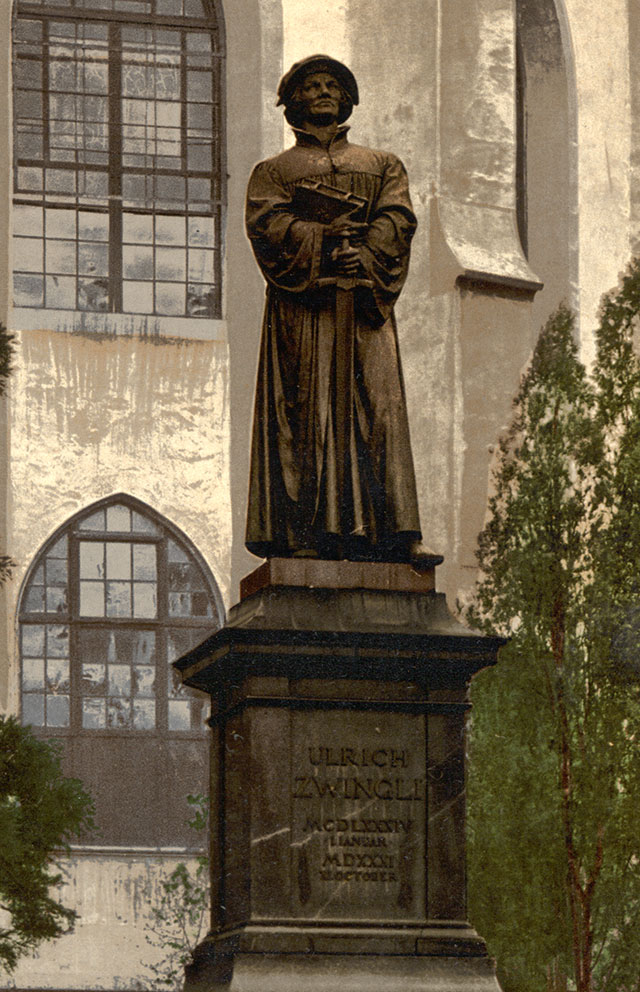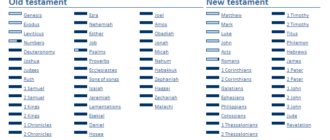
The Swiss Reformers: Emphasizing the Clarity and Certainty of Scripture
The Swiss Reformers were a group of influential theologians and thinkers who played a crucial role in the Protestant Reformation. They sought to bring about a renewal of the Christian faith, focusing on the clarity and certainty of Scripture as the foundation for their theological beliefs and practices.
One of the key principles of the Swiss Reformers was the idea that the Bible, as the inspired word of God, was clear and understandable to all believers. They rejected the notion that only the clergy or educated elites had the authority to interpret Scripture. Instead, they emphasized the priesthood of all believers, encouraging each individual to read and study the Bible for themselves.
This emphasis on the clarity of Scripture was closely tied to the idea of certainty. The Swiss Reformers believed that the Bible provided a sure and reliable guide for faith and practice. They saw it as a source of absolute truth, free from error or ambiguity. This conviction in the certainty of Scripture gave them confidence in their theological convictions and fueled their efforts to reform the church.
In their pursuit of clarity and certainty, the Swiss Reformers also emphasized the importance of using sound methods of interpretation. They advocated for a literal, grammatical, and historical approach to understanding the biblical text. By carefully studying the original languages, historical context, and literary genres of the Bible, they sought to uncover its intended meaning and apply it to their own lives and the life of the church.
Overall, the Swiss Reformers were passionate advocates for the clarity and certainty of Scripture. They believed that the Bible was not just a historical document or a collection of moral teachings, but the living and active word of God. Their commitment to studying and understanding Scripture continues to influence Christian theology and practice to this day.
The Role of Scripture in Swiss Reformation
The Swiss Reformation, led by influential reformers such as Huldrych Zwingli and John Calvin, placed a strong emphasis on the certainty and clarity of Scripture. These reformers believed that the Bible was the ultimate authority in matters of faith and practice, and they sought to bring about a reformation of the church based on the teachings of Scripture.
One of the key principles of the Swiss Reformation was the idea that Scripture should be accessible to all believers. The reformers believed that every Christian should be able to read and understand the Bible for themselves, and they worked to translate the Scriptures into the vernacular languages of the people. This emphasis on the clarity of Scripture helped to empower individuals and communities to engage with the Word of God directly, without the need for intermediaries or the hierarchy of the Catholic Church.
The reformers also believed in the certainty of Scripture. They saw the Bible as a reliable and infallible source of truth, and they held that its teachings were clear and unambiguous. This belief in the certainty of Scripture provided a solid foundation for the Swiss Reformation, as it allowed the reformers to confidently challenge the teachings and practices of the Catholic Church.
Furthermore, the reformers used Scripture as a tool for critiquing and reforming the church. They compared the teachings and practices of the Catholic Church with the teachings of Scripture, and they sought to bring the church into alignment with the Word of God. This approach was central to the Swiss Reformation, as it allowed the reformers to challenge the authority of the Catholic Church and call for a return to the teachings of Scripture.
In conclusion, the role of Scripture in the Swiss Reformation was central and foundational. The reformers placed a strong emphasis on the certainty and clarity of Scripture, believing that it was the ultimate authority in matters of faith and practice. They worked to make the Bible accessible to all believers, and they used Scripture as a tool for critiquing and reforming the church. The Swiss Reformation was ultimately a movement driven by the teachings and principles of Scripture, and it had a profound impact on the religious and cultural landscape of Switzerland and beyond.
The Influence of Martin Luther’s Ideas
The ideas of Martin Luther had a profound impact on the Swiss Reformers and their understanding of the clarity and certainty of Scripture. Luther’s emphasis on the authority of Scripture and the need for its translation into the vernacular language resonated with the Swiss Reformers, who also sought to make the Bible accessible to the common people.
One of Luther’s key ideas was the doctrine of sola scriptura, which emphasized the Bible as the sole authority for Christian faith and practice. This idea greatly influenced the Swiss Reformers, who also believed in the primacy of Scripture and its ability to guide believers in matters of doctrine and worship.
Luther’s translation of the Bible into German was a monumental achievement that inspired the Swiss Reformers to undertake their own translations of the Bible into their respective languages. This helped to further spread the ideas of the Reformation and ensure that the Scriptures were accessible to a wider audience.
Another important aspect of Luther’s ideas that influenced the Swiss Reformers was his emphasis on the priesthood of all believers. Luther argued that all Christians had direct access to God through faith in Christ, and this challenged the hierarchical structure of the Catholic Church. The Swiss Reformers, such as Ulrich Zwingli and John Calvin, also emphasized the priesthood of all believers and the importance of individual interpretation of Scripture.
In conclusion, the ideas of Martin Luther played a significant role in shaping the beliefs and practices of the Swiss Reformers. His emphasis on the authority and accessibility of Scripture, as well as his ideas about the priesthood of all believers, greatly influenced the Swiss Reformers’ understanding of the clarity and certainty of Scripture.
Zwingli’s Emphasis on Biblical Authority
Zwingli, one of the prominent Swiss reformers, placed great emphasis on the authority of Scripture. He firmly believed in the clarity and certainty of the Bible as the ultimate source of truth and guidance for believers. For Zwingli, the Swiss reform movement was not just a reaction against the corrupt practices of the Catholic Church, but a return to the pure teachings of Scripture.
Zwingli’s commitment to the authority of Scripture can be seen in his approach to theology and church practices. He believed that every aspect of Christian faith and practice should be grounded in the clear teachings of the Bible. This meant that traditions and practices that could not be directly supported by Scripture were to be rejected.
Zwingli’s emphasis on biblical authority also led him to advocate for the translation of the Bible into the vernacular Swiss German language. He believed that the Bible should be accessible to all believers, not just the clergy. This emphasis on making the Scriptures available to the common people played a significant role in the spread of the Reformation in Switzerland.
Furthermore, Zwingli’s emphasis on biblical authority also influenced his view of church governance. He rejected the hierarchical structure of the Catholic Church and instead advocated for a more democratic model of church leadership. According to Zwingli, church leaders should be chosen based on their knowledge of Scripture and their ability to teach and interpret it accurately.
In conclusion, Zwingli’s emphasis on biblical authority was a central aspect of his reform movement in Switzerland. His belief in the clarity and certainty of Scripture shaped his theology, church practices, and view of church governance. Zwingli’s commitment to the authority of Scripture continues to influence Protestant churches to this day.
Calvin’s Understanding of Scripture
John Calvin, a prominent figure among the Swiss Reformers, had a deep understanding and appreciation for the certainty and clarity of Scripture. He believed that the Bible was the inspired word of God and that it provided a clear and reliable guide for Christian faith and practice.
Calvin emphasized the importance of studying and interpreting Scripture accurately. He believed that the Holy Spirit played a vital role in guiding believers to understand the true meaning of the text. Calvin also emphasized the need for careful exegetical analysis, taking into account the historical and cultural context in which the biblical texts were written.
For Calvin, Scripture was not merely a collection of ancient writings, but a living and relevant word that spoke directly to the hearts and minds of believers. He saw Scripture as a means through which God revealed Himself and His will to humanity, providing instructions for righteous living and salvation.
In his Institutes of the Christian Religion, Calvin outlined his understanding of the authority of Scripture. He argued that Scripture alone should be the ultimate authority in matters of faith and practice, surpassing human traditions and opinions. Calvin believed that Scripture was self-authenticating and carried its own authority, without the need for external validation.
Overall, Calvin’s understanding of Scripture was marked by a firm belief in its certainty and clarity. He saw the Bible as a reliable and trustworthy source of divine revelation, providing guidance and instruction for the Christian life. Calvin’s emphasis on the authority of Scripture continues to influence Reformed theology to this day.
The Development of Reformed Theology
The development of Reformed theology was a significant movement within the Protestant Reformation. It was characterized by a strong emphasis on the authority and clarity of Scripture.
The reformers, such as John Calvin and Huldrych Zwingli, believed that Scripture was the ultimate source of truth and that it provided certainty and clarity in matters of faith and doctrine. They rejected the authority of the Catholic Church and its traditions, asserting that Scripture alone should be the foundation for Christian belief and practice.
One of the key principles of Reformed theology was the doctrine of sola scriptura, which emphasized the sufficiency of Scripture as the sole infallible rule of faith. This meant that all doctrine and practice should be derived from Scripture alone, and that it was the final authority in all matters of faith and life.
The reformers also emphasized the perspicuity of Scripture, meaning that it was clear and understandable to all believers. They believed that the Holy Spirit enabled believers to interpret Scripture correctly and that it was not necessary to rely on the interpretation of the Church or its leaders.
The development of Reformed theology had a profound impact on the Protestant movement and contributed to the formation of various Reformed denominations. It continues to shape the beliefs and practices of many Christians today, emphasizing the certainty and clarity of Scripture as the foundation for faith and doctrine.
The Clarity of Scripture as a Foundation
The Swiss reformers placed great emphasis on the clarity of Scripture as a foundational principle. They believed that the Bible was the ultimate authority and that it could be understood by all believers. This concept of clarity, or perspicuity, was central to their understanding of the Christian faith.
The reformers argued that God had revealed Himself through the Scriptures in a way that was clear and understandable. They rejected the notion that only the clergy or educated elite could interpret the Bible. Instead, they believed that all believers had the ability to read and understand the Word of God.
This belief in the clarity of Scripture had significant implications for the reformers’ approach to theology and church practice. It meant that they sought to base their teachings and practices solely on what was explicitly taught in the Bible. They rejected the authority of tradition and the teachings of the Roman Catholic Church that were not supported by Scripture.
The Swiss reformers also believed that the clarity of Scripture provided certainty and assurance for believers. They saw the Bible as a reliable and trustworthy source of truth, and they sought to build their faith on its teachings. This gave them confidence in their salvation and in their ability to live according to God’s will.
In summary, the Swiss reformers considered the clarity of Scripture to be a foundational principle of their faith. They believed that the Bible was clear and understandable to all believers, and they sought to base their teachings and practices solely on its teachings. This belief provided them with certainty and assurance in their faith and gave them confidence in their relationship with God.
The Certainty of Scripture in the Reformation
During the Swiss Reformation, the clarity and certainty of Scripture played a central role in the theological developments of the reformers. These Swiss reformers, such as Ulrich Zwingli and John Calvin, emphasized the importance of Scripture as the ultimate authority in matters of faith and doctrine.
One of the key aspects of the Swiss reformers’ understanding of the certainty of Scripture was its clarity. They believed that the Bible was written in a way that could be understood by all believers, regardless of their education or social status. This emphasis on clarity allowed the reformers to challenge the traditional interpretations and teachings of the Catholic Church, which often relied on the authority of the clergy.
Furthermore, the Swiss reformers saw Scripture as the infallible and unchanging Word of God. They believed that the Bible was inspired by the Holy Spirit and therefore free from error. This conviction in the certainty of Scripture gave the reformers confidence in their teachings and allowed them to challenge the doctrines and practices of the Catholic Church.
To ensure the clarity and certainty of Scripture, the Swiss reformers also emphasized the importance of proper interpretation. They believed that Scripture should be interpreted in its historical and literary context, using the principles of exegesis. This approach to interpretation helped to prevent misinterpretation and allowed the reformers to arrive at a more accurate understanding of the biblical texts.
In conclusion, the Swiss reformers placed a strong emphasis on the clarity and certainty of Scripture during the Reformation. They believed that the Bible was clear, infallible, and the ultimate authority in matters of faith and doctrine. This belief allowed them to challenge the teachings of the Catholic Church and develop a theological framework that would shape Protestantism for centuries to come.
The Authority of Scripture in Church Practices
The Swiss reformers placed a strong emphasis on the authority of Scripture in shaping church practices. They believed that the certainty and clarity of Scripture provided a solid foundation for the governance and worship of the church.
By studying and interpreting the Swiss reformers’ writings, one can see their unwavering commitment to Scripture as the ultimate authority in matters of faith and practice. They believed that the Bible was inspired by God and therefore infallible and without error.

The Swiss reformers also believed in the perspicuity of Scripture, meaning that it could be understood by all believers. They rejected the idea that only the clergy or educated elite could interpret the Bible, and instead advocated for the priesthood of all believers.
This emphasis on the authority of Scripture had significant implications for church practices. The Swiss reformers sought to align all aspects of worship and governance with the teachings of Scripture. They emphasized the importance of preaching, sacraments, and prayer as central elements of worship, all rooted in the biblical text.
Furthermore, the Swiss reformers sought to reform church practices that they believed were not in line with Scripture. They challenged the authority of the Pope and the Roman Catholic Church, advocating for a return to the practices of the early church as described in the New Testament.
In conclusion, the Swiss reformers viewed the authority of Scripture as paramount in shaping church practices. The certainty and clarity of Scripture provided them with a solid foundation for worship, governance, and the reform of the church. Their commitment to the authority of Scripture continues to influence Protestant churches to this day.
The Use of Scripture in Preaching
One of the key elements of Swiss Reformation was the emphasis on the certainty and clarity of Scripture in preaching. The Swiss reformers believed that the Bible was the ultimate authority and should be used as the foundation for all sermons. They saw it as their duty to accurately interpret and explain the Word of God to the congregation.
In their preaching, the Swiss reformers relied heavily on the study and analysis of Scripture. They would carefully examine the original languages, consult various commentaries, and compare different passages to ensure a comprehensive understanding of the text. This rigorous approach allowed them to present a clear and accurate interpretation of the biblical message.
Furthermore, the Swiss reformers believed in the power of Scripture to transform lives. They saw preaching as a means to convey the truth of God’s Word and bring about spiritual growth and renewal in the lives of believers. They would often use vivid and relatable examples from everyday life to help their audience understand and apply the teachings of Scripture.
In order to ensure the clarity of their sermons, the Swiss reformers also emphasized the importance of simplicity in language and style. They believed that the message of Scripture should be accessible to all, regardless of their education or social status. They avoided unnecessary theological jargon and instead used plain and straightforward language to communicate the truths of the Bible.
Overall, the Swiss reformers approached preaching with a deep reverence for Scripture and a commitment to its faithful exposition. Their use of Scripture in preaching was characterized by certainty, clarity, and a desire to bring about spiritual transformation in the lives of their hearers.
The Translation of Scripture into the Vernacular
The Swiss Reformers recognized the importance of making the Scriptures accessible to the common people in their own language. They believed that the clarity and certainty of Scripture could only be fully understood by the average person if it was translated into the vernacular. This was a radical departure from the prevailing practice of the Catholic Church, which maintained that the Scriptures should only be read and interpreted by the clergy.
The Swiss Reformers, such as Huldrych Zwingli and John Calvin, were committed to translating the Bible into the vernacular languages spoken by the people. They believed that the Word of God should be available to all, not just the educated elite. This commitment to translation was driven by their belief in the clarity and certainty of Scripture. They believed that the Bible was clear and could be understood by anyone who read it, with the help of the Holy Spirit.
The translation of Scripture into the vernacular was not without its challenges. The Swiss Reformers had to grapple with issues of language and dialect, as well as the need for accuracy and fidelity to the original texts. They also had to navigate the political and religious landscape of their time, as their efforts to translate the Bible into the vernacular were met with resistance from the Catholic Church and other authorities.
Despite these challenges, the Swiss Reformers persevered in their mission to make the Scriptures accessible to the common people. They believed that the clarity and certainty of Scripture were essential for the spiritual growth and well-being of individuals and the church as a whole. Their translation efforts laid the foundation for the development of vernacular Bibles in Switzerland and beyond, and their legacy continues to shape the way we understand and interpret the Scriptures today.
The Accessibility of Scripture to the Laity
The Swiss Reformers, including Zwingli and Calvin, emphasized the importance of making scripture accessible to the laity. They believed that all believers should have the opportunity to read and understand the word of God for themselves, rather than relying solely on the interpretations of clergy.
One of the ways the Swiss Reformers promoted the accessibility of scripture was through the translation of the Bible into the vernacular languages. Prior to the Reformation, the Bible was primarily available in Latin, which limited its accessibility to those who were educated in that language. By translating the Bible into languages such as German and French, the Swiss Reformers made scripture more accessible to the common people.
The Swiss Reformers also emphasized the clarity of scripture. They believed that the Bible was written in a way that could be understood by all, regardless of education or social status. This belief was in contrast to the Catholic Church’s view that the interpretation of scripture was reserved for clergy and scholars. The Swiss Reformers taught that the Holy Spirit would guide believers in their understanding of scripture, and that everyone had the ability to discern the truth.
To further promote the accessibility of scripture, the Swiss Reformers encouraged the reading and study of the Bible by the laity. They believed that regular engagement with scripture would deepen believers’ understanding of God’s word and strengthen their faith. They also emphasized the importance of preaching that was based on scripture, rather than relying on human traditions or doctrines.
In conclusion, the Swiss Reformers played a significant role in making scripture more accessible to the laity. Through translation, teaching, and a belief in the clarity of scripture, they sought to empower all believers to engage with the word of God for themselves. This emphasis on accessibility continues to be an important aspect of Protestant Christianity today.
The Impact of Scripture on Social and Political Changes
The Swiss reformers strongly believed in the power and authority of scripture to bring about significant social and political changes in their society. They saw scripture as the ultimate source of truth and guidance, and they sought to align their social and political structures with its teachings.
Through their study and interpretation of scripture, the Swiss reformers developed a clear understanding of God’s will for society and government. They emphasized the importance of justice, mercy, and equality, and they used scripture to challenge and critique the existing social and political systems that they believed were oppressive and unjust.
The certainty of scripture gave the Swiss reformers confidence in their efforts to bring about social and political changes. They believed that scripture provided them with a solid foundation and a clear direction for reform. They used scripture to advocate for religious freedom, the abolition of corrupt practices, and the protection of the rights and dignity of all individuals.
The impact of scripture on social and political changes in Switzerland was profound. The Swiss reformers’ emphasis on scripture influenced the development of democratic principles and the establishment of a more equitable society. Their teachings and writings inspired a spirit of reform and resistance to tyranny that would continue to shape Swiss society for centuries to come.
In conclusion, the Swiss reformers recognized the transformative power of scripture and its ability to bring about social and political changes. They used scripture to challenge and critique existing systems, advocate for justice and equality, and inspire a spirit of reform. The impact of their efforts can still be seen in the democratic principles and more equitable society that Switzerland enjoys today.
The Challenges to Scriptural Clarity and Certainty
The Swiss Reformers faced several challenges in their pursuit of scriptural clarity and certainty. One of the main challenges was the entrenched power of the Catholic Church, which had long held authority over religious doctrine and interpretation. The Reformers, such as Ulrich Zwingli and John Calvin, sought to challenge this authority and return to a more direct and personal understanding of scripture.
Another challenge was the diversity of interpretations among the Reformers themselves. While they shared a common goal of reforming the Church, they often had differing views on specific theological issues. This led to debates and disagreements, which sometimes hindered their efforts to establish a unified and clear understanding of scripture.
Additionally, the Reformers faced opposition from traditionalists who were resistant to change. These individuals, both within and outside of the Church, were often suspicious of the Reformers’ attempts to question long-held beliefs and practices. This resistance created further obstacles to achieving scriptural clarity and certainty.
Furthermore, the availability and accessibility of scripture presented a challenge. The Reformers emphasized the importance of scripture being accessible to all believers, but the printing press was still a relatively new invention during this time. This meant that copies of the Bible were not as readily available as they are today, making it difficult for individuals to study and interpret scripture for themselves.
Despite these challenges, the Swiss Reformers persevered in their quest for scriptural clarity and certainty. Through their writings, sermons, and debates, they sought to bring about a greater understanding of scripture and its application to everyday life. Their efforts laid the foundation for future generations to continue the work of interpreting and applying scripture in a way that brings clarity and certainty to believers.
The Response of the Reformers to Criticisms
When faced with criticisms regarding the clarity and certainty of scripture, the Swiss Reformers were not deterred. Instead, they responded with conviction and a steadfast commitment to the truth of God’s word.
One of their main arguments in defense of the clarity of scripture was that God, being the author of the Bible, intended for it to be understood by all believers. They believed that the message of salvation was not reserved for an elite few, but rather, it was accessible to anyone who sought to study and understand it.
The Swiss Reformers also emphasized the importance of the Holy Spirit in the interpretation of scripture. They believed that the Spirit guided believers in their understanding of the Bible, and that through prayer and meditation, one could gain a deeper insight into its meaning.
In response to criticisms of the certainty of scripture, the Reformers pointed to the reliability of the biblical texts. They argued that the manuscripts were carefully preserved and transmitted throughout history, ensuring that the message of scripture remained intact. They also highlighted the consistency and coherence of the biblical message, which they saw as evidence of its divine origin.
Furthermore, the Reformers emphasized the importance of studying scripture in its original languages, such as Hebrew and Greek. They believed that a thorough understanding of the original texts was crucial for accurate interpretation and avoiding potential errors in translation.
Overall, the Swiss Reformers were unwavering in their belief in the clarity and certainty of scripture. They saw the Bible as the ultimate authority in matters of faith and doctrine, and they were willing to defend its truth against any criticisms or challenges that arose.
The Continuation of the Reformation’s Legacy
The Swiss reformers played a crucial role in establishing the clarity and certainty of scripture during the Reformation. Their commitment to studying and interpreting the Bible in its original languages, as well as their emphasis on the authority of scripture, laid the foundation for a lasting legacy.
One of the key contributions of the Swiss reformers was their focus on the clarity of scripture. They believed that the Bible was written in a way that could be understood by all people, regardless of their education or social status. This emphasis on clarity meant that the reformers sought to make the scriptures accessible to the common people, translating the Bible into the vernacular languages and preaching in a way that was understandable to all.
The Swiss reformers also emphasized the certainty of scripture. They believed that the Bible was the inspired word of God and that it contained all necessary knowledge for salvation. This conviction led them to reject certain traditions and teachings of the Catholic Church that they believed were not supported by scripture. Instead, they sought to base their beliefs and practices solely on what was clearly taught in the Bible.
The legacy of the Swiss reformers continues to this day. Their commitment to the clarity and certainty of scripture has influenced countless generations of Christians, shaping the way we read and understand the Bible. Their emphasis on studying and interpreting scripture in its original languages has also contributed to the development of biblical scholarship and the translation of the Bible into various languages.
Today, we can still learn from the Swiss reformers’ example. Their dedication to the authority of scripture and their belief in its clarity and certainty remind us of the importance of grounding our faith and practice in the word of God. Their legacy challenges us to continually study and interpret the scriptures for ourselves, seeking to understand and apply its teachings in our lives.
The Influence of Swiss Reformers on Other Reformation Movements
The Swiss reformers played a significant role in shaping and influencing other reformation movements across Europe. Their emphasis on the certainty and clarity of scripture had a profound impact on the way other reformers approached their own theological interpretations and teachings.
One of the key contributions of the Swiss reformers was their commitment to the authority of scripture. Figures such as Ulrich Zwingli and John Calvin emphasized the importance of going back to the original text of the Bible to understand God’s message. This emphasis on scripture as the ultimate source of truth and guidance became a central tenet of many other reformation movements.
Furthermore, the Swiss reformers’ emphasis on the clarity of scripture also had a significant influence on other reformers. They believed that the Bible was clear and understandable to all believers, not just the clergy. This idea challenged the traditional authority of the church and opened up the possibility for individuals to read and interpret the Bible for themselves. This emphasis on individual interpretation of scripture became a cornerstone of many other reformation movements.
The Swiss reformers also played a role in spreading their ideas and teachings to other parts of Europe. Many Swiss reformers, such as Calvin, established schools and academies where they trained future leaders and theologians. These educated individuals then went on to spread the Swiss reformers’ ideas and teachings to other regions, including Germany, France, and the Netherlands. This dissemination of ideas helped to fuel and shape other reformation movements across Europe.
In conclusion, the Swiss reformers had a significant influence on other reformation movements through their





